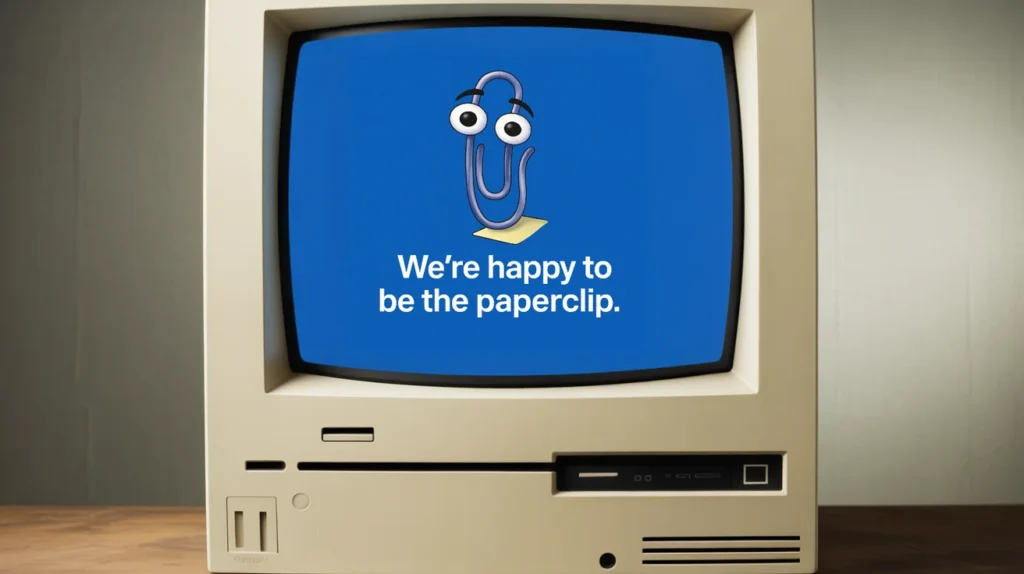Remember Clippy?
If you used Microsoft Office in the late 90s, you probably remember Clippy — the animated paperclip who popped up with helpful tips:
“It looks like you’re writing a letter. Would you like some assistance?”
He was quirky. Sometimes irritating. But his mission was clear — to help you complete the task you were working on.
He didn’t track your keystrokes.
He didn’t sell your email address.
He didn’t suddenly recommend a brand of paper because someone paid him to.
Why Clippy Is Back — and It’s Not Just Nostalgia
In 2025, tech repair advocate Louis Rossmann started encouraging people to change their social media profile pictures to Clippy. This wasn’t a retro trend — it was a protest.
The message?
Clippy might have been clumsy, but he was on your side. Today’s “helpful” assistants — whether in your phone, your browser, or your smart devices — often aren’t.
They offer convenience while quietly collecting and selling your personal data, or nudging you into behaviours that serve the platform’s profit, not your needs.
Clippy, in this context, has become a symbol for the kind of help that’s actually helpful.
From Clippy to Clickbait — A Timeline
| Year | Event | Meaning |
|---|---|---|
| 1997 | Clippy debuts in Microsoft Office 97. | A well-meaning (if intrusive) helper. |
| 2001 | Clippy is quietly retired. | End of the era of simple, single-purpose assistants. |
| 2010s | Rise of smartphones & “smart” assistants. | Help becomes intertwined with data collection. |
| 2020s | AI assistants become mainstream. | Data harvesting is normalised — and monetised. |
| 2025 | Clippy protest goes viral. | Pushback against exploitation disguised as help. |
Financial Services: A Familiar Pattern
You might think this is purely a tech industry issue. But in financial services, similar tactics can be found:
- Over-collection of data: Not just what’s needed to process your application, but anything that might be “useful” later.
- Hidden incentives: Products pushed because they pay higher commissions, not because they fit your needs.
- Bait offers: “Free” consultations designed to upsell you into costly, unsuitable products.
It’s the same playbook: Position yourself as the helpful assistant, but design the system to serve your profit first.
“The system is often built to optimise profit, not outcomes for the client.”
What Happens When Profit Comes First
Take the classic “packaged” deal you might be offered by an estate agent:
“For one simple fee, we’ll arrange your mortgage, handle the legal work, organise the survey, and keep it all under one roof.”
It sounds like a time-saver — but in reality, packaging all these services into one neat bundle is often just window dressing. The solicitor, mortgage broker, or surveyor involved may be perfectly good professionals — but the way the deal is structured can mean substantial referral fees are built into the price.
By presenting it as a single, all-inclusive fee, it’s made to look better value than it often is. In truth, you might be paying more than if you’d chosen each service individually — and you’ve had no real say in who you’re working with.
That’s the opposite of transparency, and it rarely gets you the best deal. It’s a funnel, not a consultation. You’re the product, and the “help” you’re given is engineered to maximise return — for them.
Why Quick Mortgages Chooses the Clippy Way
At Quick Mortgages, we’d rather take the paperclip approach:
- Minimal, essential data collection — only what’s needed to secure your mortgage.
- No selling your data — ever.
- Transparent fees & commissions — you know exactly how we’re paid.
- Recommendations based on fit, not profit — if it’s not right for you, it’s not on the table.
The Bigger Picture — Trust in a Data-Driven World
The Clippy protest isn’t really about a cartoon paperclip. It’s about people demanding control over their own information and choices.
In tech, that means refusing to be a passive source of clicks and behavioural data. In finance, it means expecting genuine advice — not guidance designed to squeeze the most out of your budget.
“Help should be about you, not about how much you’re worth to us.”
If We Ever Have a Mascot…
If Quick Mortgages ever gets a mascot, we’d want it to be like Clippy: Friendly. Transparent. Entirely on your side.
And unlike the original, we promise we won’t pop up uninvited in the middle of your day.
In an age of AI assistants, targeted ads, and relentless data collection, there’s something oddly comforting about the idea of a simple paperclip whose only goal was to help. We think financial services should work the same way — and that’s exactly how we work at Quick Mortgages.
——–
Disclaimer:
This article is for general guidance purposes only and does not constitute legal, financial, or professional advice. Mortgage products and their terms can vary, and it is important to seek advice from a qualified, regulated professional who can assess your individual circumstances. Please ensure you consider your unique needs before making any financial decisions.
While every effort is made to ensure that the information provided on this blog is accurate and up-to-date, we do not guarantee its completeness or accuracy. The mortgage market can change rapidly, and the information on this blog may become outdated. We recommend verifying any information before acting on it and seeking tailored advice.
THINK CAREFULLY BEFORE SECURING OTHER DEBTS AGAINST YOUR HOME. YOUR HOME OR PROPERTY MAY BE REPOSSESSED IF YOU DO NOT KEEP UP REPAYMENTS ON A MORTGAGE OR ANY OTHER DEBT SECURED ON IT.
